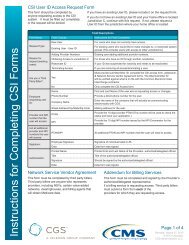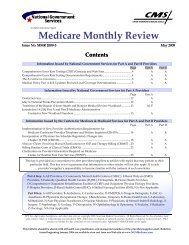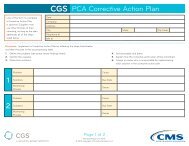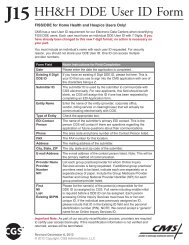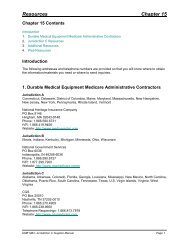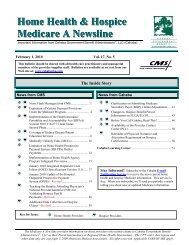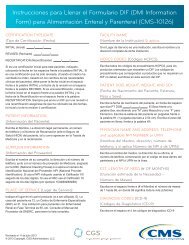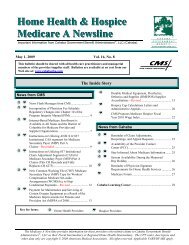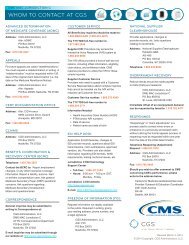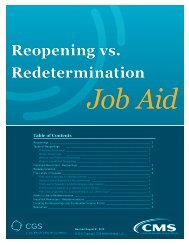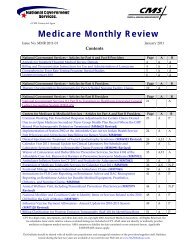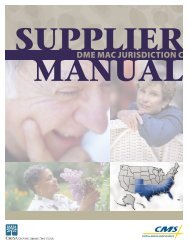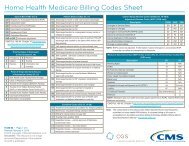April 1, 2010, Home Health & Hospice Medicare A Newsline - CGS
April 1, 2010, Home Health & Hospice Medicare A Newsline - CGS
April 1, 2010, Home Health & Hospice Medicare A Newsline - CGS
Create successful ePaper yourself
Turn your PDF publications into a flip-book with our unique Google optimized e-Paper software.
<strong>Medicare</strong> ForumDo you have a <strong>Medicare</strong> question or topic that you would like addressed in the <strong>Home</strong> <strong>Health</strong> & <strong>Hospice</strong><strong>Medicare</strong> A <strong>Newsline</strong>? If so, fax it to the Provider Outreach and Education (POE) department at 515-471-7584, or e-mail it to ianewsline@cahabagba.com. Please include your facility’s name and provider number,your name and telephone number. Responses to the inquiries received in this e-mail box will be providedonly through the <strong>Medicare</strong> Forum article, if appropriate. If you need an immediate response to a question,please contact a Customer Service Representative (CSR) for assistance by accessing the “Contact Us” pageon our Web site and select “Phone Us”. We also welcome your comments or suggestions on thispublication and other Cahaba GBA, LLC customer service activities.Q1. Can a patient continue to receive homecare and go to a Partial Hospitalization PsychiatricProgram? The patient is going 5 days a week for 4 hours a day. Does this become a homeboundstatus issue and should the patient be discharged?The only regulation we can find is in the <strong>Medicare</strong> Benefits Policy Manual Chapter 7, §30.1.1which states: Any absence of an individual from the home attributable to the need to receivehealth care treatment, including regular absences for the purpose of participating in therapeutic,psychosocial, or medical treatment in an adult day-care program that is licensed or certified by astate, or accredited to furnish adult Day-care services in a State should not disqualify anindividual from being considered to be confined to his home.A1. A patient may leave the home for health care treatment, and still be considered homebound. Thesetreatments may include dialysis, physician visits, wound care clinics, adult day care, or even PartialHospitalization Programs (PHPs), as long as the patient still meets the other criteria of homebound, andthese are fully documented in the patient’s medical record. It becomes much more difficult to supportthat a patient has health characteristics and limitations that would regularly confine him/her to theirhome when the patient leaves home for a treatment like PHP. The absences are routine, and the levelof activity in PHPs are routinely more than most homebound patients would be able to tolerate orparticipate in. A PHP includes clinically recognized therapeutic interventions, including group andfamily psychotherapy sessions, occupational, activity, and psychoeducational groups pertinent to thepatient’s illness. The medical record would need clear, strong evidence of the taxing effort it takes toleave the home in objective terms, describing the pain, dyspnea, poor balance, or other limitations.Q2. Does this mean that the patient can leave the home on a regular basis for therapeutic,Psychosocial or medical treatment that is provided in an adult day-care center only? Is thetherapeutic and psychosocial treatment separate from the medical treatment in the adult daycarecenter or are all 3 services only allowed if they are provided in an adult day-care center?The way we are reading this is that the therapeutic, psychosocial and medical treatments can beprovided on regular basis if they are being provided in a certified day-care center only. Are weinterpreting this correctly?<strong>Home</strong> <strong>Health</strong> & <strong>Hospice</strong> <strong>April</strong> 1, <strong>2010</strong> 45<strong>Medicare</strong> A <strong>Newsline</strong> Vol. 17, No. 7



